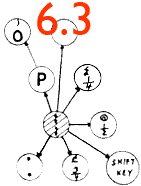REVIEW
Aliases & the Ambuscade:
A Review of Misty Harper's Guarding the Violins, Poetry Society of America, 2006
Paul Klinger
And the nominations for Best Alias in Guarding the Violins are:
- The Stagehands
- Smashed Tangerine
- Happily Ever After
- Bygone Lover
- Mr. Bouquet Crotch
The space stuck between these assumed names is often
more telling than the name itself.
Many times, the name splits up, subdivides
(wind-doe, hat-Chet, Hula-Hoop) and the book's narrator says something
like "I feel like a man who has costumed / half of his body like
a woman." Naming becomes theatrical, a staging of the split which
mechanizes each of the poems so that by the book's end, the reader will
be well-acquainted with Fracture and its performances.
Misty Harper's book was recently adapted
into a one-act play. Resetting Harper's poems for performance was a particularly
brilliant idea, as it reveals the wonderful strangeness of the book, which
refuses to cooperate, even under oath. By special arrangement, we are
pleased to offer here a sneak peek of scenes from the daring new play.
Trying the Violins
Scene I: The Arraignment of the Violins
The book is charged with obstruction of justice.
In custody, the book offers an explanation:
I was born on my due date,
I was placed on a red plate.
The Judge: Nonsense. You are also charged with impersonating an allegory and intent to burlesque. How do you plead?
The Book: Not guilty, your honor. It was self-defense.
Scene II: The Book has its Day in Court
Ladies and Gentlemen of the Jury, the victim...
Scene III: The Book takes the stand
First question: In your affidavit, you mention you
were guarding the violins.
What did you mean by that?
The Book: I believe I have answered that question several times. So let me repeat myself: I will go out of my way to avoid the Idiots.
Second question: Do you think merci has anything to do with mercy?
The Book: If a word's
origin is Latin,
then the plural will not fatten.
Second question: Answer the question!
The Book: If the
trapeze artist falls into the net,
then there will be sequins in the dirt.
Third question: Thank you. Your Honor, the prosecution rests.
Scene IV: Recess
The Defense: Well, you did what the Prosecutors wanted you to do.
The Book: O Sawbones,
this one don't look too good.
Scene V: Before Sentencing
The Judge: Does the defendant wish to address the court before Sentence is announced?
The Book: Entire
populations of parasites and hosts
Have agreed to try and work out their differences.
The Judge: Anything else?
The Book: Who was
the sad inventor of the curtain?
Might he have been a Puritan?
The Judge: That's enough. Come to order.
Even on its own stage, Harper's book lovingly reels between reflection
and deflection. The narration pushes its own need to perform, a wishful
wreaking best seen at the end of "Addenda:"
It's sad, I know,
but don't you cry.
No need to feel
bad, O Everything
I Thought I Had.
While Guarding the Violins gestures towards self-defense, it very quietly carries out an extended accusation, its real solo performance. Quoting from an old love letter, the narrator of "Circuses" admits, "I begin telling stories to occupy myself. / I play both storyteller and child." Harper leans on a strategy close to pantomime, where a single actress plays all the parts. Often, that show will sound a prediction, such as the one with which Harper ends the book: "I'm going to end with a preposition / to bother you, strict grammarian." This end note casts backward on the book's meticulous plotting, which would seem to belie its gentle nature. Though she performs brilliantly in this capacity, Harper traces the sadness the book radiates to its being a one person show.
Keywords: alias, allegory, burlesque, hard-boiled, merci, mercy, pantomime
